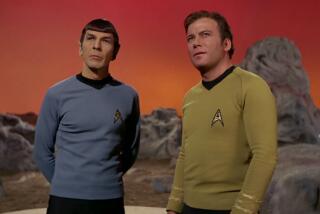5 in state win MacArthur prize
- Share via
Caltech behavioral economist Colin Camerer has researched a lot about how the chance of big financial gains affects the human brain. So he knew that his own brain area known as the nucleus accumbens was stimulated by the announcement that he won $625,000 as one of this year’s MacArthur Foundation Fellows.
That part of the brain “responds to surprise rewards, it produces the internal sensation of ‘I won, I won,’ ” said Camerer, who is being given the so-called genius award for his work on human behavior during stock market bubbles and other economic events. Besides buying his wife a fancy new watch and donating money to charity, Camerer, 53, said he would plow most of the prize back into brain scan experiments on “emotional early warning signals” about risky investments.
He is among this year’s 24 MacArthur winners -- 13 men and 11 women -- across the country, according to the Chicago-based foundation that rewards creativity in science, humanities, arts and social service. The no-strings prize has been boosted from the previous $500,000 and is paid out over five years.
The other winners being announced Wednesday include a New Jersey physician who works on meeting the medical needs of poor people, a Massachusetts historian who studies medieval Britain, a Colorado physicist researching ultra-cold atoms, an Alaska immigration attorney and two New York choreographers.
Besides Camerer, four other Californians were tapped for the prize, which began in 1981 from an insurance and real estate fortune and remains secretive about its selections.
Carl Haber, a physicist at the UC-run Lawrence Berkeley National Laboratory, applies high-tech methods to extract sound from very old and fragile audio recordings on wax cylinders and even tinfoil. Among his team’s noted projects was restoring an 1885 recording of the voice of Alexander Graham Bell, inventor of the telephone.
Haber, 54, said he was shocked by the prize and plans to devote the funds to more such research. The preservation of sound, whether music or spoken word, is important to history and culture, said Haber, who also works in high-energy physics. “Sound recordings give us this magnificent window into the breadth of human endeavors,” he said.
David Lobell, 34, a Stanford University agricultural ecologist, researches the effect of climate change on crop production and food supplies. He said the money will free him from the pressures of grant applications and enable him to take his wife and two young sons on his research trips around the world.
He hopes his studies will help farmers and labs breed grains that can thrive in extreme heat and droughts. “I think climate change is definitely one of the reasons for concerns about whether we will be able to feed our population going forward,” he said.
The other Californians are Phil Baran, 36, an organic chemist at Scripps Research institute in La Jolla, who has mimicked natural sources to create drugs that fight bacteria, viruses and tumors; and C. Kevin Boyce, 39, a Stanford University paleobotanist who researches ancient plant remains.
A list of this year’s winners can be found at: https://www.macfound.org.
--







